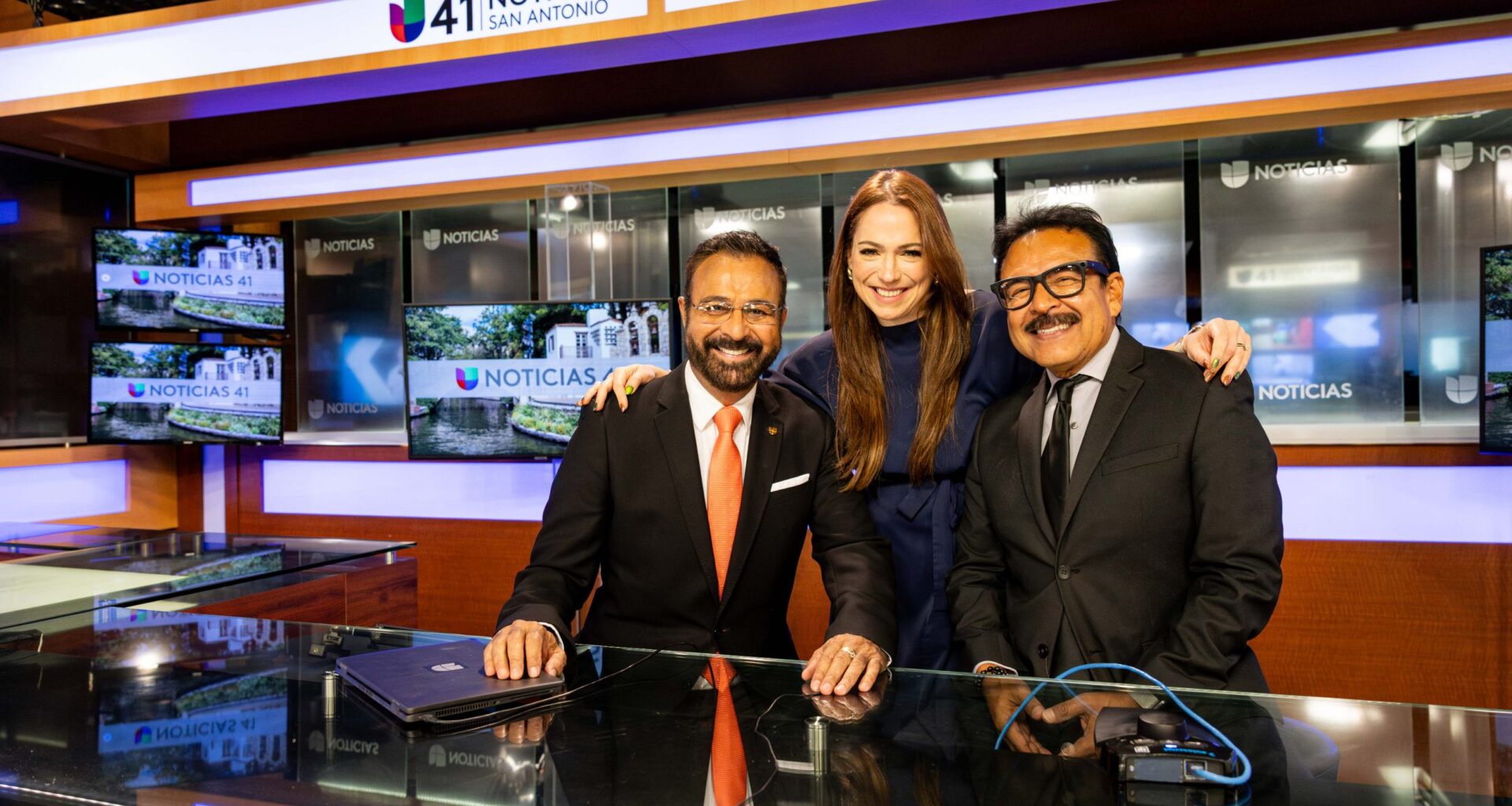Back in the 1960s, there were federal laws that limited the amount of broadcast stations a person could run. But, Univision’s pioneer Emilio Nicolas Sr. found a loophole.
He would find a phone booth and he would look for Hispanic surnames. The visionary for the nation’s first Spanish-language news television station would then call every Latino professional he could until one would meet with him and agreed to take part in his business. He did this 200 times all across the nation.
Nicolas Sr. would then send lawyers, satellites and programming to the new owners to establish TV stations.
Univision celebrates its 70th anniversary this year. Its legacy of providing accessible Spanish-language news media started right here in San Antonio.
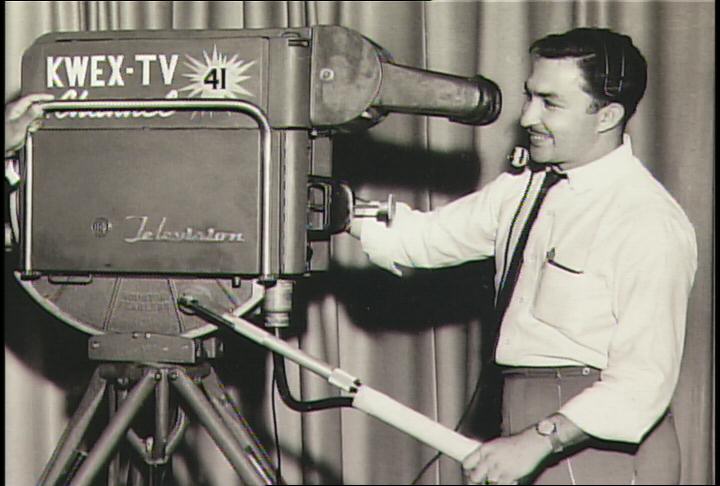 Cameraman and reporter Andrés Morin records a broadcast for KWEX-TV in this undated archive photo. Credit: Courtesy / Univision 41
Cameraman and reporter Andrés Morin records a broadcast for KWEX-TV in this undated archive photo. Credit: Courtesy / Univision 41
“These 70 years of history aren’t Univision’s history,” Antonio Guillén said in Spanish. “These 70 years are the history of Channel 41 — they’re San Antonio’s history.”
Guillén started reporting for Univision in 1988 and has become something of a local hero to the community, especially those who rely on his news coverage at Univision 41. He’s often seen at breaking news events broadcasting live from the scene.
He said that while he was offered an office at the TV station, he prefers to stay out in the field.
“I told Univision that if they wanted me to stay, they’d have to trust me and my cameras,” he said. “They agreed, so I take my own photos, take my own videos, and I edit it all myself in my car before I send it over to Univision. No one is faster than me.”
Guillén’s work has earned him and the station multiple Emmys, highlighting important issues in and around San Antonio.
“The first ever words in Spanish out of a TV box in the states came out of San Antonio,” he said. Today, dozens of TV channels across the U.S. broadcast Spanish-language news, drama and sports coverage.
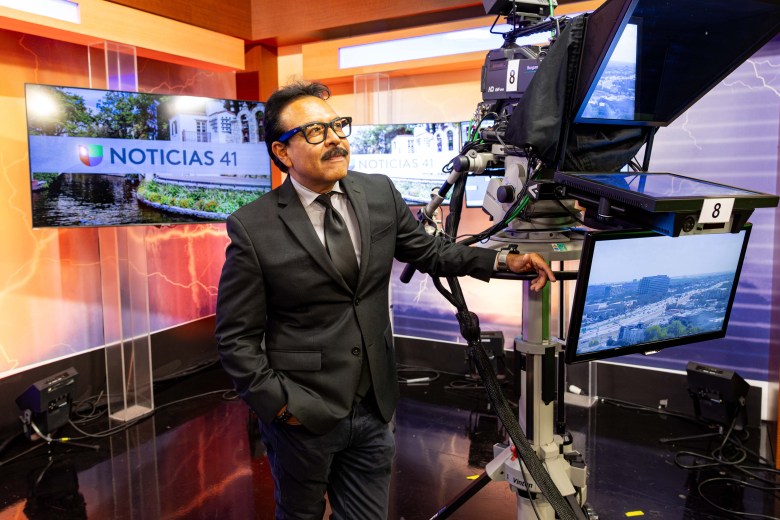 Univision 41 Multimedia Journalist Antonio Guillén in the Noticias San Antonio newsroom on Oct. 6, 2025. Credit: Amber Esparza / San Antonio Report
Univision 41 Multimedia Journalist Antonio Guillén in the Noticias San Antonio newsroom on Oct. 6, 2025. Credit: Amber Esparza / San Antonio Report
“There is, I think, an absence of recognition for San Anto’s role in the rise of Univision,” said Jerry Gonzalez, history professor and director of St. Mary University’s new Center for Mexican American Studies.
He clarified that Univision’s website doesn’t make specific mention of its roots in San Antonio outside of its anniversary celebrations. “Here, locally, we see it, but it’s not very visibly recognized by Univision,” he said.
Gonzalez reflected on the station’s early beginnings when Mexican Americans were faced with the impact of World War II in its communities, particularly segregation in housing and education.
“At certain points in our history, this media has served of critical importance to our civil rights,” he said. “Part of the effort to organize in support of more fair education and housing was transmitted through the radio and eventually the television. There is a whole history of our civil rights in this media that people aren’t aware of.”
Known by many names
Univision is known here by many names: KWEX, Channel 41, KCOR and Univision 41.
KCOR refers to KCOR-TV, founded by Raoul A. Cortez in June 1955. Cortez had spent the previous decade establishing KCOR as the first Mexican American-owned, full-time Spanish-language radio station before he started broadcasting on TV.
The first Spanish TV station began operating in the northwest part of the city, near I-10.
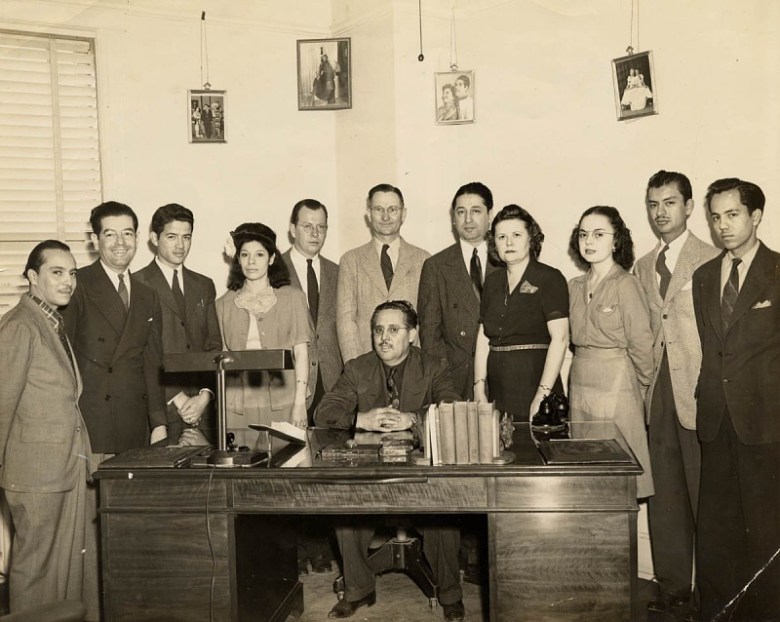 KCOR founder Raoul A. Cortez sits for a photo with radio station staff in his office in 1949. Credit: Courtesy / Univision 41
KCOR founder Raoul A. Cortez sits for a photo with radio station staff in his office in 1949. Credit: Courtesy / Univision 41
Cortez sold the TV station to his son-in-law Emilio Nicolas Sr. and his business partners in 1961, and the station’s name changed to KUAL-TV later that year. It would change once more the next year to KWEX-TV. That same year, Nicolas Sr. opened KMEX-TV in Los Angeles, bringing the start of the Spanish International Network (SIN), the U.S.’s first satellite-interconnected television network.
“[Cortez] and [Nicolas Sr.] were not the best of friends, I don’t think they liked each other very much,” said Guillermo Nicolas, Nicolas Sr.’s youngest son. “But they were smart men, and they knew they were doing something important together.”
While the 61-year-old Nicolas isn’t involved in Univision today, he holds immense pride in his family’s pioneering history. He currently serves on the Texas Public Radio’s board of directors.
In 2019, TPR and Nicolas announced the naming of the Irma and Emilio Nicolas Media Center, housed in Alameda Theater, where Cortez produced programming for the KCOR radio station.
Five years earlier, community advocates tried to preserve KWEX’s original studio on 411 E. César E. Chávez Blvd. after it was approved for demolition by the city’s Office of Historic Preservation.
“When the developer of the land wanted to tear the building down, the city suggested they put up some kind of historical marker of where the KWEX building once stood,” said Gonzalez. “There was significant community outcry. The Westside Preservation Alliance organized demonstrations and letter writing campaigns.”
The WPA was able to delay the building’s demolition for several days by filing for an injunction with the court. When that didn’t work, activists jumped the fence and wouldn’t leave the site.
Graciela Sanchez, director of the Esperanza Peace and Justice Center, was one of those protestors. “Somebody from the community came and dropped off a little table and chairs, and somebody else brought tacos, somebody else brought tea,” she recalled. “We stayed there for a while, and eventually the cops did come.”
She and others were arrested and the building was eventually demolished.
Trailblazers in San Antonio
Martha Tijerina broke barriers as one of the first women in Spanish-language television in the United States when she was hired at KWEX-TV in 1970.
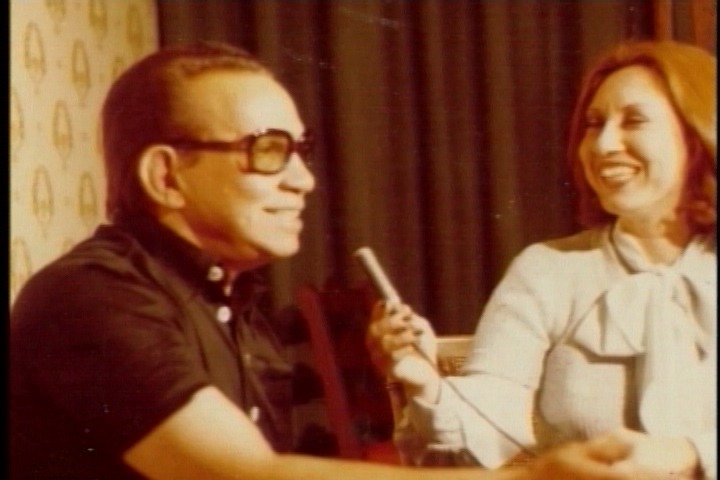 Reporter Martha Tijerina interviews comedian and actor Cantinflas for KWEX-TV. Credit: Courtesy / Martha Tijerina
Reporter Martha Tijerina interviews comedian and actor Cantinflas for KWEX-TV. Credit: Courtesy / Martha Tijerina
San Antonio Express-News columnist Elaine Ayala wrote of Tijerina’s many on-air accomplishments, which includes her show “En San Antonio.” She featured Mexican American and Chicano activists, politicians, educators, religious leaders and others in the midst of tremendous change and tumult.
For that work, she was featured in a Smithsonian exhibit titled, “¡De última hora! Latinas Report Breaking News” at the National Museum of American History in Washington, D.C.
“The needs of the community from the days that I started, during the Chicano movement — those needs still exist,” said Tijerina. “People should challenge the people giving them their news, introduce new perspectives. We can only uplift ourselves if we uplift each other first.”
Tijerina is still on the airwaves hosting her show on Catholic Television of San Antonio.
She credits her success to Nicolas Sr., singing his praises far and wide.
“I don’t think any of us fully understand what he did. He didn’t have anyone to follow,” Tijerina said. “It was a whole network, and it was one man doing it. He was sales, he was production, he was everything. On top of that, he was just so supportive of everyone who worked for him.”
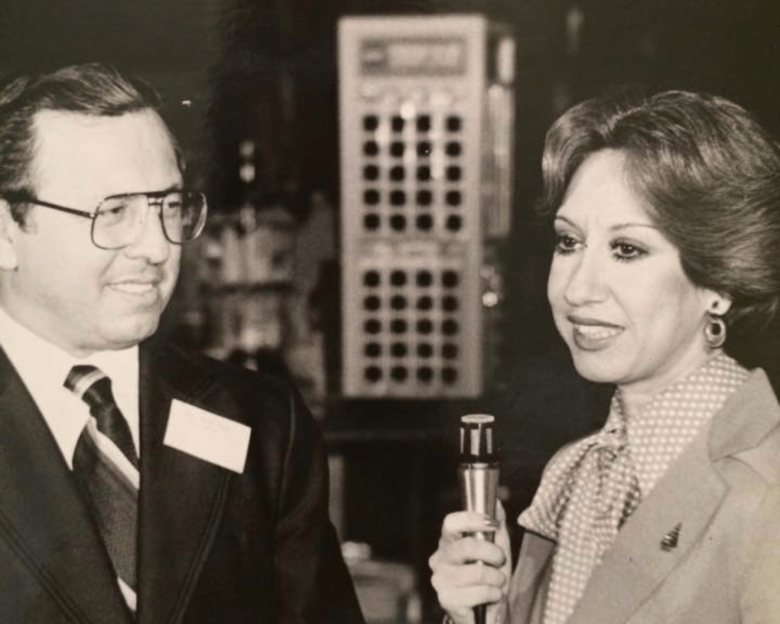 Reporter Martha Tijerina interviews former Texas State Sen. Carlos F. Truan for KWEX-TV. Credit: Courtesy / Martha Tijerina
Reporter Martha Tijerina interviews former Texas State Sen. Carlos F. Truan for KWEX-TV. Credit: Courtesy / Martha Tijerina
With KWEX-TV under Nicolas Sr.’s leadership, the news broadcasting industry would see several changes. When people struggled to tune in without a way to receive the broadcast on their TV sets, Nicolas Sr. would advocate for them to be sold with converter boxes.
Nicolas Sr. traveled all over the U.S. to establish TV stations under SIN, but he would come back to San Antonio every time. He lived and worked in San Antonio for the rest of his life, even after SIN was sold to Hallmark Cards and Televisa, rebranding as Univision in 1987.
Univision would grow larger and larger, launching several of its iconic broadcast segments between 1989 and 1998, such as “Primer Impacto” in 1994 and “Despierta America” in 1997.
Over the years, the Spanish news network became a household name with a legacy of providing accessible news media made for Spanish-speaking families in the U.S.. According to a 2024 Pew Research study, 69% of Hispanic immigrants get their news from Hispanic news outlets.
“We’re dedicated to the whole family,” Univision 41 Anchor Jorge Núñez said in Spanish. “We’re dedicated to reaching grandmas and mothers, and through them we reach the children who sit down and watch along. There’s a certain family magic that we try to connect to, and it goes on for generations.”
Guillén remembers the time a family approached him on the street. Their little boy pointed at him and said, “Look, mom, it’s my daddy!” Guillén couldn’t stop laughing as he recounted one of many silly interactions with viewers. “His father said, ‘Look at this guy, he sees you on the news everyday and he thinks you’re his dad!’ I had to say, ‘No, no! I don’t know you or your son.’ I was just grateful he understood the situation!”
Univision works intentionally to engage with local viewers — and local viewers engage with the reporters they see on TV. Núñez has been part of several of Univision’s telethons and walks in parks with viewers, and he said it’s his favorite part of the job.
“At the end of the day, we work for the public audience,” Núñez said in Spanish. “They ask for advice on immigration, and it’s such a big responsibility. The most we can do is be honest with what we do and don’t know and suggest they find a lawyer. They’ll keep us updated and even let us know if they get a court date.”
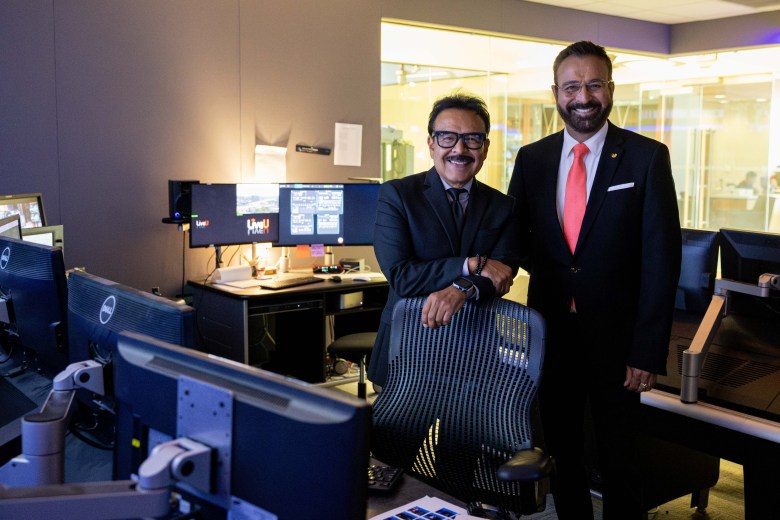 Univision 41 Anchor Jorge Núñez and Multimedia Journalist Antonio Guillén in the Noticias San Antonio control room on Oct. 6, 2025. Credit: Amber Esparza / San Antonio Report
Univision 41 Anchor Jorge Núñez and Multimedia Journalist Antonio Guillén in the Noticias San Antonio control room on Oct. 6, 2025. Credit: Amber Esparza / San Antonio Report
In 2012, Univision 41 collaborated with several universities in San Antonio and launched Proyecto U, an education partnership program that would allow students to receive direct mentorship from the station’s staff. It was discontinued in 2020.
“I was really impressed with the mentorship the students received under the program,” said Jenny Moore, the communications professor at Texas A&M University-San Antonio. “I’ve never worked with an organization so committed to mentorship and community engagement.”
Students in the program developed hands-on experience in broadcasting and assisted Univision 41 with broadcasts throughout the semester. They would have class with their professor in a classroom inside the studio before getting to work with staff members at the station.
“We have a lot of communities at risk of not being heard,” Moore said. “Univision has built and defined what it means to have community engagement and serve an audience.”
For Univision’s Guillén and Núñez, there is no place like San Antonio.
“They offered to transfer me to the Miami headquarters,” Núñez said in Spanish. “I declined. I’ve known for a while now that I want to stay in San Antonio. I don’t see myself going anywhere else.”
“I’ve never even considered leaving,” Guillén said. Even after covering California’s wildfires and the U.S.-Mexico border crises, he’s made it clear that he intends to continue covering local matters in the same city he’s spent most of his journalistic career in. “It’s San Antonio, baby!”
